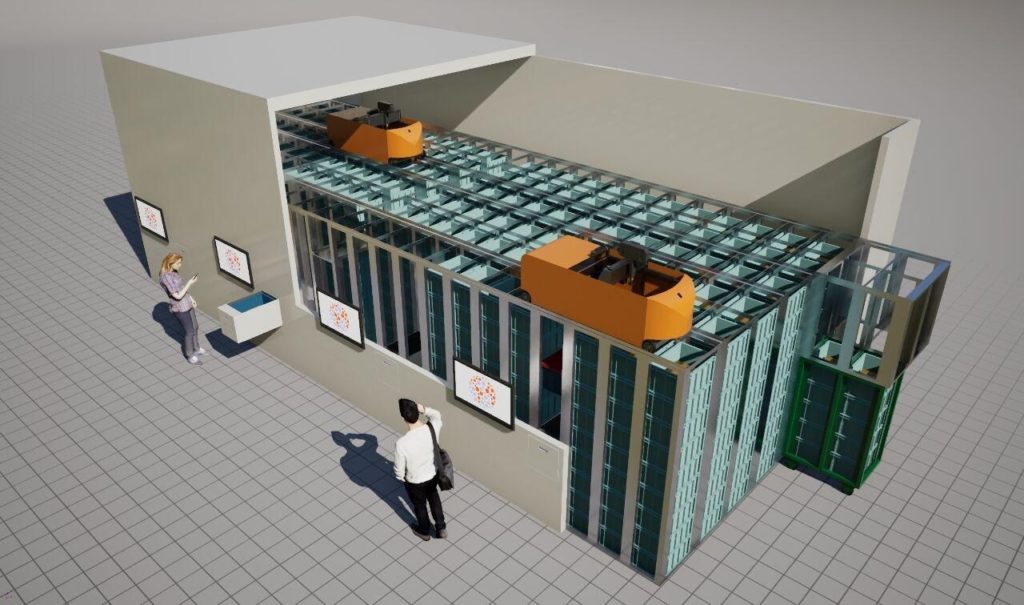Online grocery trends are growing rapidly as consumers continue to shift towards convenience in their shopping habits. With the grocery market being one of the largest consumer markets in the world, food manufacturers are trying to find their place in the transitioning grocery space. German tech company INS has developed a digital platform that allows food manufacturers to bypass the brick-and-mortar retail landscape and sell their products directly to their consumers with prices that are up to 30 percent lower than in supermarkets. On Friday, the company announced their partnership with German robotics start-up Pickertonn to develop automated pick-up points (modules) for consumers.
The INS Ecosystem is a decentralized marketplace that allows consumers to purchase foods directly from food manufacturers. This system allows food manufacturers to avoid hiked up prices for their goods and profit directly from consumers. Consumers can use this service by logging into the INS Ecosystem platform where they can select their food products for purchase and have them delivered straight to their doors or dropped off at a pick-up point.
Pickertonn’s automated pick-up points will contain an assortment of 2,000 frequently purchased items for consumers to select from. Robots within the pick-up module will automatically fulfill orders within minutes and serve customers on the spot. This new addition to the INS ecosystem allows manufacturers to have their products reach the hands of their consumers instantly without having to pay traditional brick-and-mortar fees. In addition, Pickertonn’s automated pick-up points require no employees, saving food companies 10 percent versus traditional brick-and-mortar stores. These locations also require less energy and are four times smaller than traditional stores.
Although this system sounds similar to other online grocery providers, INS claims that they have eliminated common obstacles associated with online grocery for food companies. Food manufacturers are able to interact with their customers directly using the INS platform and they are able to select the price of each item. In addition, food companies can interact with their consumers, offer promotions and receive feedback. The only responsibilities that food manufacturers have in this process is publishing their products, delivering their products to INS automated fulfillment centers and spreading the news about the INS ecosystem with promotions. So far, food manufacturers are only charged a one percent transaction fee for putting their products on the system. In addition, because all of INS’s fulfillment centers are automated, food manufacturers save on paying extra for the needs of full time employees.
The ecosystem also utilizes blockchain, smart contracts and cryptocurrencies to stand out in the online grocery space. This allows food companies to manage supply chain records, manage marketing campaigns and facilitate the use of INS tokens – a new form of cryptocurrency that can be used to pay for items in the INS ecosystem. INS tokens are the only form of currency used for marketing and rewards programs in the INS ecosystem. This allows food manufacturers and INS to bring in returning customers.
According to INS, food companies face a lot of challenges when it comes to selling their products the traditional brick-and-mortar way. Food manufacturers would usually have to sell their products in bulk and at a significantly lower rate to wholesalers who then sell their products to grocery chains. In addition, grocery chains tend to scale the prices of such products at a higher rate than private label products. This, in turn, causes many consumers to purchase the cheaper varieties of food products that are usually under private label brands, which is evident in their recent 2017 earnings that surpassed national brand earnings. This means that food manufacturers usually get the shorter end of the stick when it comes to traditional brick-and-mortar retail.
This new grocery shopping ecosystem provides a lot of opportunity for food manufacturers to profit directly from their customers. It also allows consumers to purchase name brand products at a lower price while still having the convenience of home delivery and automated pickup. The INS ecosystem is set to launch in Amsterdam later this year, other locations they are looking into include New York, Los Angeles, London, Paris and Sydney. The company is also working on producing their own faster and more scalable blockchain system.
“Our direct-to-consumer marketplace has a tremendous potential to transform the industry as we know it today. We are creating our own blockchain, which would correspond to the grocery industry specifics and challenges to power the supply chain and help eliminate intermediaries for groceries to become more affordable,” said Peter Fedchenkov, INS Ecosystem Co-Founder.












Join or login to leave a comment
JOIN LOGIN